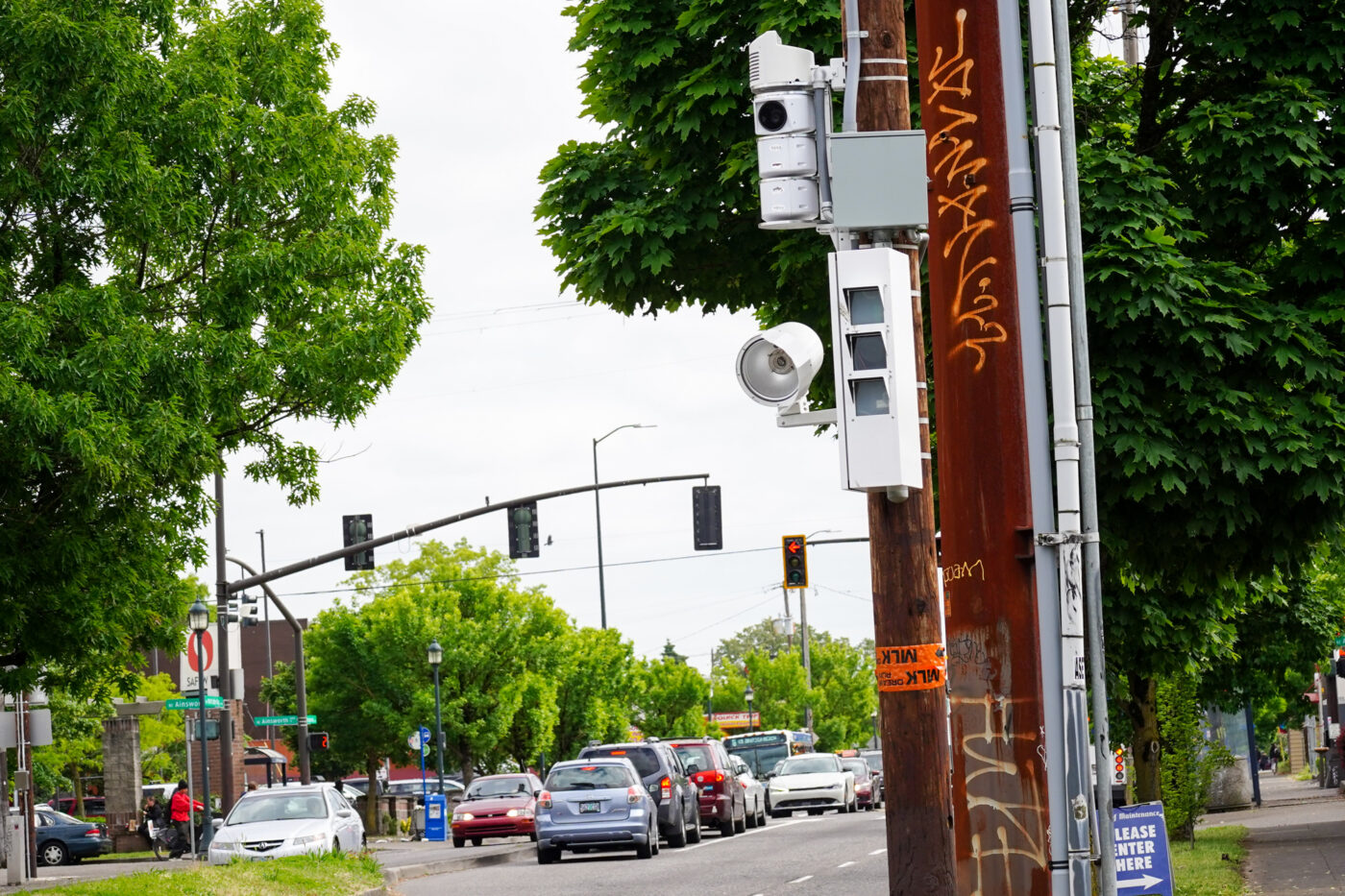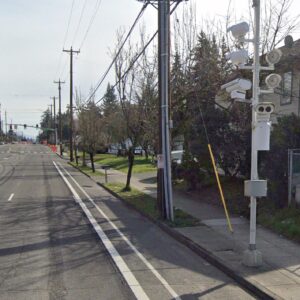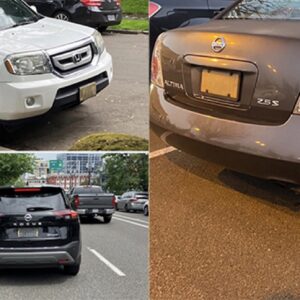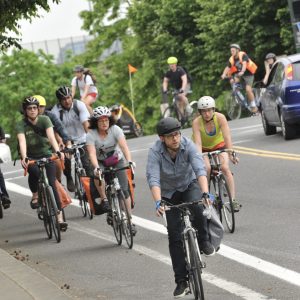
As our community grasps for solutions to our ongoing crisis of traffic crashes and fatalities, the City of Portland has launched a survey to gauge our mood about automated enforcement cameras.
In a statement today, the Portland Bureau of Transportation says they’ve teamed up with the Portland Police Bureau to ask all Portlanders how they feel about enforcement cameras and road safety in general. “Feedback from the survey will help the city better meet community needs and expectations,” they say.
Portland began its camera program in 2016, following the passage of a state law in 2015 that authorized their use for the first time ever. It took four years to get just four locations equipped with them and and the delays frustrated many advocates. One problem was a bottleneck at the PPB, since each citation (and there were around 42,000 of them per year in the first few years) had to be verified by a sworn officer. That bottleneck was fixed in 2022 when Oregon lawmakers passed a bill allowing non-police to review and process citations. Another source of delay was the camera vendors, who former PBOT Commissioner Jo Ann Hardesty once threatened to fire because of it.
Today it seems like PBOT has ironed out the wrinkles and there are now 28 cameras actively issuing citations (with two under repair) and another 10 coming online soon. The city deploys two types of cameras: one just for speeding and the other, “intersection safety cameras,” that can also cite for red light running.
I haven’t heard what prompted this latest survey, but based on city documents about the program, PBOT does a survey once per year just to monitor public perception. This will also give the agency fresh information to indoctrinate a new slate of City Council candidates and a new mayor next year.
They survey asks a range of questions about the cameras. It also queries respondents about the role of speeding in traffic crashes, whether or not the city is doing enough enforcement of traffic laws in general, and more.
Take the survey here.







Thanks for reading.
BikePortland has served this community with independent community journalism since 2005. We rely on subscriptions from readers like you to survive. Your financial support is vital in keeping this valuable resource alive and well.
Please subscribe today to strengthen and expand our work.
It seems like the bad news of traffic related injuries and deaths in Portland just doesn’t stop. I was very sad to see that city council candidate Noah Ernst was just hit by a drunk driver. We need traffic enforcement, not more surveys.
https://www.kgw.com/article/news/politics/elections/portland-city-council-candidate-noah-ernst-hit-by-drunk-driver/283-372eed97-5c8f-4eb4-bd86-a9a979df3025
I am really interested in what Portlanders think about this topic, but the self-selected group of folks taking it isn’t going to tell us.
I mean, who cares what people think? The vast majority of drivers self-report that they drive in a negligent and dangerous manner and they certainly don’t want to be held accountable for it.
Asking motorists if they support more traffic enforcement is like asking burglers if they support more security cameras.
PBOT should stop checking in with people who want to drive dangerously about whether or not they implement evidence-based practices to stop their behavior.
Portland can be expected to establish a committee to interpret the survey findings then set up a public involvement meeting to sift through action items. Finally, to ground-truth solutions, a fact finding trip to Amsterdam for the City Council will assure that no taxpayer funds will wasted.
Isn’t it amazing, we elect politicians to do the work they have been elected to do, NOT form performative committees that waste a lot of time and end up only profiting the special interests represented on the committees.
Why are our politicians like so much milk-toast?
Love the milk-toast reference. The term is milquetoast, from a comic 100 years ago that created the character Caspar Milquetoast, which was referencing milk-toast.
It’s unclear what the point of the survey is. PBOT should not be making safety decisions based on the opinion of people answering a survey about whether they “like” or “agree” with certain statements or enforcement practices. They should make these decisions based on what actually increases public safety. (And, btw, automated cameras that are NOT monitored by the police bureau is one of those strategies; when they monitoring cameras stays within the police bureau, then the funding is subject to competing with whatever else the police want to spend money on.). The last question was typically galling and ill-phrased. Here is my write-in answer: “We need increased traffic safety enforcement, but we also need prevention. There is ample evidence that ending turning on red lights, that enforcing state law regarding daylighting of intersections, that lowering speed limits (and especially ending the absurd practice of having so many different speed limits within the city), that changing the timing of traffic lights to slow rather than speed traffic, etc. would reduce collisions, deaths, injuries, and property damage. You can do all that AND also add the cameras and other enforcement mechanisms. OTHER JURISDICTIONS HAVE DONE IT. Stop asking the public’s opinion and start saving the public’s health.”
Also what’s with asking so many questions? Do you really want to discourage people from completing this exercise in futility?
Lois, lowering the speed limits without concurrent enforcement is performative and serves no purpose except to remind people that they don’t have to follow the law in Portland.
Not true. I see this idea repeated around, so you’re not alone. But if the speed limit is lowered, some people will follow it. The people behind them have no choice but to also follow it (mostly).
The net result is a lower speed limit means lower driving speeds on average.
This isn’t related to any of the recent fatalities of course, which were super late at night and already involved speeding. But just as a general rule, if you lower the speed limit, people will drive slower. How much depends on enforcement or culture, but it will slow down traffic.
Guess people in my neighborhood don’t follow your theory.
Quite often, when I’m going the speed limit (20), people will pass me anyway, and it’s 1 lane each direction.
People that speed, are going to speed regardless of the barriers placed in their way. Get the word out that speeders are getting ticketed will likely have a greater result than doing nothing as you champion because the speed limit signs will do it for us.
Where are you seeing John V recommending “doing nothing” for enforcement?
Disagree, my community has seen benefit from lowered speeds, especially when combined with the speed measuring “flashy” signs. Enough people respond appropriately to make a difference, even without police enforcement.
Portlandia (its a vibe) narcissism is prolix, an overflow of options and information and meetings, rules, and blah blah blah. Case in point: the new ballot.
Thank God the trend of telling the coffee roaster’s (food cart owner/processed food entrepreneur’s) long boring personal story on the $20 10oz coffee packs is over.
Everyone’s apparently a knowledgeable amateur expert in this town with plenty of time to educate themselves and opine on every possible thing, The ugly downside of the amateur hobbyism that I used to find so cool about Portland.
A better survey:
“Do you support red light and speeding cameras?” Y/N
Thank you for filling out the survey.
Agreed. Even better would be no survey and some actual enforcement of our traffic laws.
Safety is one value, competing with others, and balancing competing values is an inherently political question.
Why not ask people what they think? This “survey” was designed to produce a particular answer in any case.
I couldn’t agree more Lois. It is incredibly galling that the City would ask the general public whether or not the City should enforce its own existing laws. We know that when these laws are violated people and property are threatened, injured, and killed. I also don’t think the public should be consulted about the efficacy of different enforcement approaches when there is ample evidence available to the professionals hired specifically to make such decisions. These laws (cars must stop at red lights, cars must not exceed the legal speed limit, etc.) govern life and death situations and the City is derelict in its duty to protect life and safety by letting conditions deteriorate as they have. Might as well email the Vision Zero team to say so…
I suspect that, like congestion charging, this is one of those things it’s probably best to ask about after it’s been implemented. People are always read to complain about speed cameras, but then when pressed about why they’re complaining, they’ll concede that it’s because they want to drive faster.
I am very much a car person, but the speed of modern cars, combined with the practical necessity they are for a lot of people, and the traffic caused by there being so many of them when there’s often not a viable alternative, does a number on people’s objectivity about these things. Driving somewhere is, for a lot of people, often not about the driving, but about getting somewhere as fast as possible, even if we know that this is a dangerous way to think.
Ah the enlighted Portlanders of our cherished inner city think pushing even more traffic out to the east side of town is a good idea. Punitive road diets, ugly and worthless plastic bollards will not save you.
PBOT is conducting a survey for the same reason that all other jurisdictions do it, because the feds told them they have to do it.
What upsets me most about these surveys is not that they are ignored, but that in most jurisdictions most of the people filling them out are employees of the DOT, their allied agencies, and the corporate contractors they hire for various projects – members of the public rarely have the time nor the inclination to fill them out.